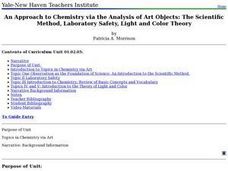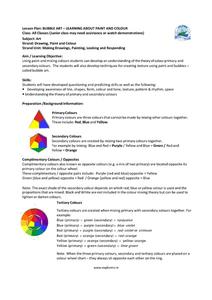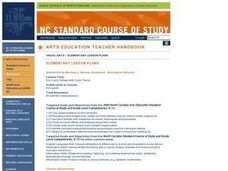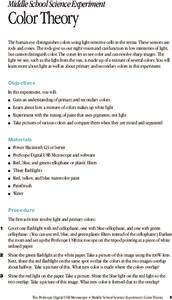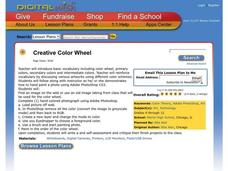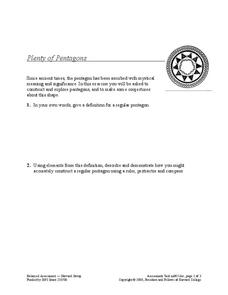Curated OER
Color Theory
Sixth graders explore the basics of color mixing with paint by creating secondary and tertiary colors. Individually, 6th graders create their own paintings based on a popular series of sculptures.
Curated OER
Painting a Color Wheel
You have to love the color wheel, it's just so colorful! Your kids will love it too, as they work through an introductory exercise which allows them the opportunity to draw and paint a color wheel of their own. This wheel focuses on...
Curated OER
An Approach to Chemistry via the Analysis of Art Objects: The Scientific Method, Laboratory Safety, Light and Color Theory
Students create a painting that clearly exemplifies the use of primary pigments to make secondary pigments. They demonstrate the distinction between value and saturation. They explain the affect of adjacent colors on each other and...
MENSA Education & Research Foundation
Introduction to Color: The Foundation of Art and Design
What is the most favorite color in the world? The series of lessons all about color and the color wheel, asks kids to research color, create an eye-spy activity, watch videos, and examine the color choices made by artists in their...
Brigham Young University
Understanding Design, Composition, and Color
The set for a play combines design elements (style, line, shape, mass, measure, position, color, and texture) and principles of composition (unity, harmony, contrast, variation, balance, proportion, and emphasis) to create a particular...
Marine Institute
Bubble Art – Learning About Paint and Color
To gain an understanding of color mixing theory and the color wheel, young artists draw a picture, mix up a batch of secondary colors to which they add dish soap, and using straws, bubble up the paint. They then press their drawings onto...
Curated OER
Eric Carle Collage with Color Theory
Second graders analyze color theory and collage techniques through the creation of collages in the style of artist/author Eric Carle. Color experiments and may hands-on section allow this lesson plan to be very informative and fun for...
Sargent Art
Warhol-like Color Study
The lithographs of pop artist Andy Warhol inspire a lesson that asks young artists to try their hand at creating a study that demonstrates the effect color has on design. After drawing a self-portrait, participants paint their image in...
Curated OER
Color Theory and Acrylic Painting
Students study color, acrylic painting and abstract art.
Curated OER
Color Mix Up
In this art activity, students use the template of shapes and paint the colors as directed with water colors. Students allow the paints to dry before applying the second overlapping color. This activity is geared to the adults who will...
Curated OER
Color Theory
Students are able to gain an understanding of primary and secondary colors. They are able to explore about how a mixture of colors makes up white light. Students are able to experiment with the mixing of paint that uses pigments, not...
Curated OER
Creative Color Wheel
High schoolers explore graphic design by using color wheels to color images. In this art analysis instructional activity, students utilize Adobe Photoshop to experiment with coloring old images and removing all color as well. High...
Curated OER
The Art and Science of Impressionist Color
Discover Impressionist painting as students investigate the 19th century combinations of colors characteristically used. Students experiment with their own paintings, utilizing primary and secondary colors.
Curated OER
Color Theory Unit: Tint & Shade Strips
Students create three tint and three shade strips which depict a gradual gradation from color to white and from color to black.
Curated OER
Creative Color Wheel
In this color theory worksheet, students draw a large circle on a piece of paper and make six shapes evenly spaced around the circle. Students color the wheel according to the directions. This worksheet is geared toward adults who will...
Balanced Assessment
Plenty of Pentagons
Why are only four colors needed to color webs from regular pentagons, not five? An assessment task requires young mathematicians to first construct regular pentagons using a compass and straightedge, then has them consider a shape formed...
Art Educators of New Jersey
Exploring Eric Carle’s Painted Collage
Where does inspiration come from? Where do writers get their ideas? What about visual artists? A PowerPoint and a video introduce middle schoolers to children's author and illustrator Eric Carle and how he found inspiration in the work...
Curated OER
"3-D" Painting
Learners experiment with color using tints and shades of at least 2 hues and create a 3-D painting/mobile.
National Gallery of Canada
Counting Circles
Learners look at bands of colors and estimate how many rings of color there are. While working in groups, they come up with a plan of how to accurately count the rings. They attempt to find a pattern in the colors, and decide whether...
National Gallery of Canada
Social Realism
Examine social strife in art. Class members first observe some pieces, and then find an image to inspire their own art. They outline the picture, analyze the composition, make alterations, and color their work.
Curated OER
Color Theory Unit: Op Art Complementary Color Designs
Young scholars learn skills in mixing and applying paint while enhancing understanding of complementary colors.
Curated OER
Introduction To Acrylic Painting and the Work of Wayne Thiebaud
Seventh graders explore the basics of composition, acrylic painting techniques, and color theory, examine works of the American painter Wayne Thiebaud, and create still lifes using three pieces of candy.
Curated OER
Happy Accidents with Watercolors
Students practice the basic characteristics of painting with watercolors. They learn basic color theory using the color wheel and will be able to identify primary and secondary colors.
Curated OER
Power of Color on Emotion
Fifth graders utilize resources to select, analyze, and journal about a particular artist's expression of mood and feelings. They produce paintings that demonstrate the use of color mixing and schemes that show a variety of emotions.




